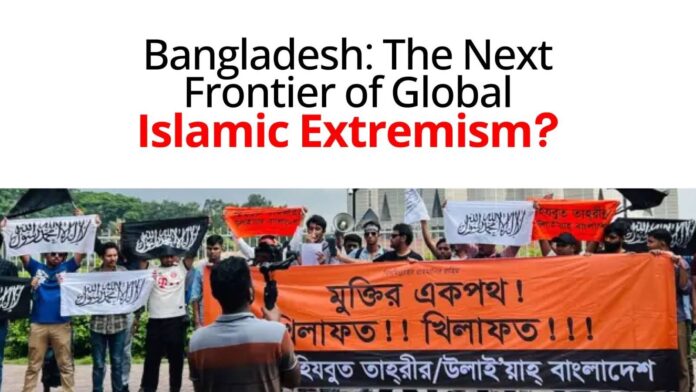The Jordanian government’s recent move to completely ban the Muslim Brotherhood sends a powerful message to the world. This decision, driven not just by national security but also global stability concerns, is being seen as a bold step in the fight against radicalism. The Brotherhood is accused of operating under disguise, sowing societal discord, and using democratic structures to spread extremist ideologies. Following the ban, Jordanian authorities raided the offices of the Islamic Action Front, seized documents, banned political activities, and began confiscating assets—reinvigorating global efforts against violent extremism.
In stark contrast, Bangladesh is veering in the opposite direction. While Jordan takes a hardline stance to eradicate extremism, Bangladesh appears to be institutionally and socially rehabilitating it. Under the leadership of Muhammad Yunus—an NGO magnate and so-called Nobel laureate—a democratically elected government was overthrown in a coup, installing an unelected regime with disturbing links to radical Islamist factions. Behind this power shift lies a dangerous alliance: Jamaat-e-Islami, Hizb ut-Tahrir, Hefazat-e-Islam, JMB, groups with ties to Al-Qaeda, ISIS, and other jihadist movements. These extremist groups are not only being reinstated but also rewarded at the state level.
These organizations are actively involved in terrorism: bomb-making, training camps, arms smuggling, harboring foreign militants, attacking minorities, and inciting violence against women. Shockingly, the state remains indifferent. Worse, the pseudo-government led by Yunus appears to be either directly or indirectly aiding these groups. Many of their leaders now occupy roles in government-backed think tanks, media outlets, and academic institutions.
Religious extremists are also dominating social media in Bangladesh. These platforms have become major tools for spreading their hate speech, bigotry, and violence. A vivid example emerged after the death of Pope Francis. While mainstream Bangladeshi media covered the news with dignity, Islamist groups launched an online hate campaign, viciously attacking the Pope and the global Christian community across Facebook, YouTube, Twitter, and Telegram.
This wave of hatred has spilled over beyond borders. When Islamic militants murdered non-Muslim Indian tourists in Kashmir, Bangladeshi extremists celebrated the killings on social media. To them, only Muslims are human—others are second-class beings. This ideology is not just dangerous—it’s a threat to human civilization itself. But how has this toxic mindset spread so rapidly?
The answer lies in a well-orchestrated conspiracy. Under Yunus’s leadership, parts of the state machinery, media, NGO networks, and military intelligence are now organizationally aligned with Islamist radicals. Their ties to international jihadist networks are well documented. Bangladesh is fast becoming a “safe haven” for arms trafficking, terror financing, and militant training across South Asia.
Yunus is exploiting the prestige of the UN, the Nobel Prize, and various Western institutions to legitimize his regime. Under the guise of human rights, poverty alleviation, and climate initiatives, an Islamist re-engineering project is underway—one whose endgame is to transform Bangladesh into a radical Islamist state.
Reports indicate that over 35 Islamic extremist groups are currently active in Bangladesh, with at least 12 linked to global terror networks. UN and U.S. counterterrorism agencies have flagged some of these, but their deep entrenchment within Bangladesh’s power structures makes it nearly impossible for foreign intelligence to act effectively.
Given this alarming situation, the international community must act now. Bangladesh must be placed under strict global surveillance. Economic sanctions should be imposed, and Yunus and his coup collaborators must be prosecuted in international tribunals. Otherwise, Bangladesh will become the next Syria or Afghanistan—where the line between state and jihad becomes indistinguishable.
This is the warning: If action is not taken immediately, the world will pay a heavy price—not just in lost security, but in the erosion of civilization itself.
Sources:
- Jordan bans the Muslim Brotherhood in a move that threatens its largest opposition party
- Bangladesh coup? Muhammad Yunus calls it just a ‘festival of rumours’
- The upsurge of radical and fundamentalist Islamic elements in Bangladesh
- Bangladesh: Terrorism Assessment
- Why Extremism Is on the Rise in Bangladesh
- Neo-Jama’at Mujahideen Bangladesh
- Bangladesh minority rights group accuses interim government of failing to protect minorities
- Jamaat-ul-Mujahideen Bangladesh





